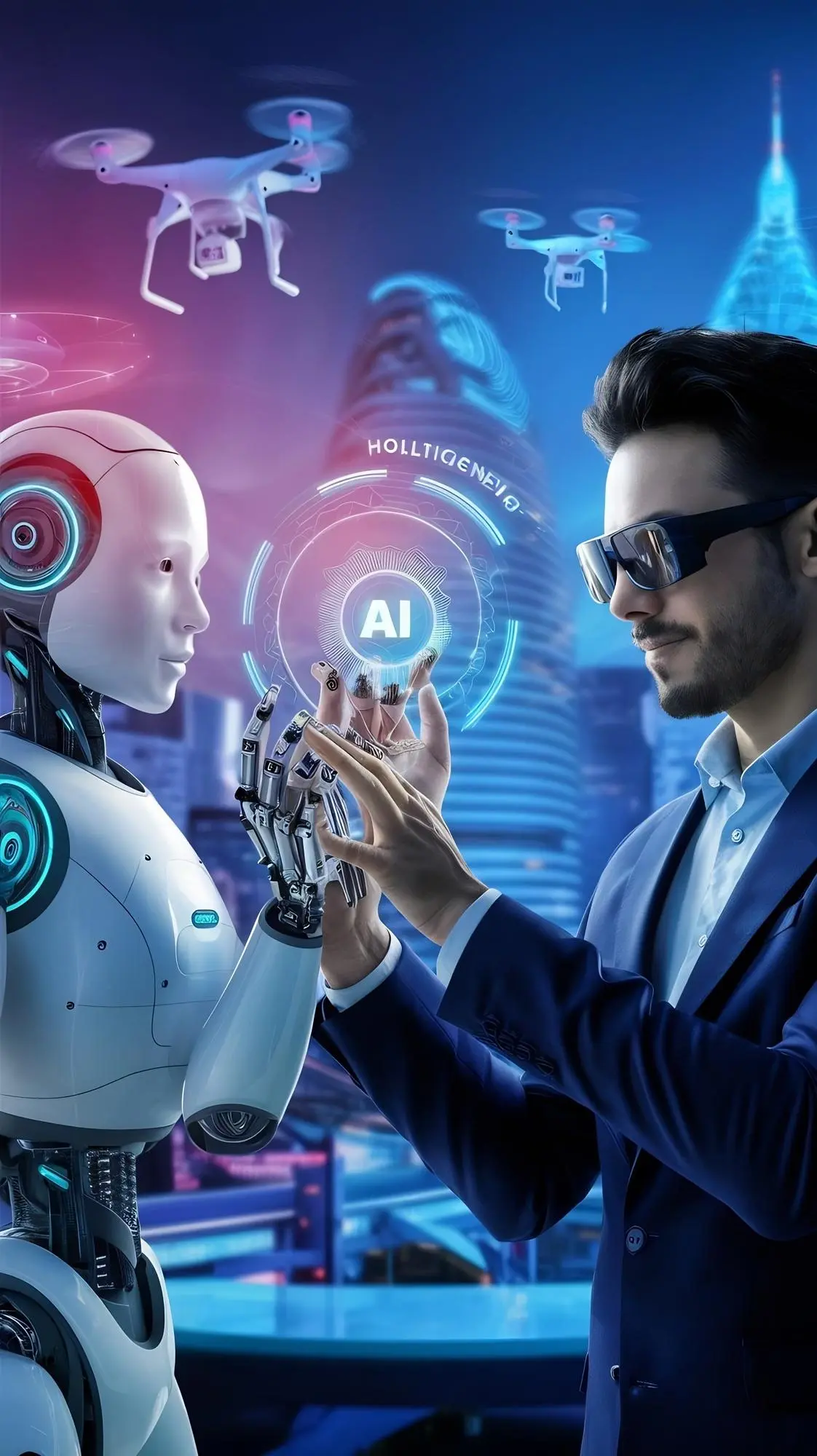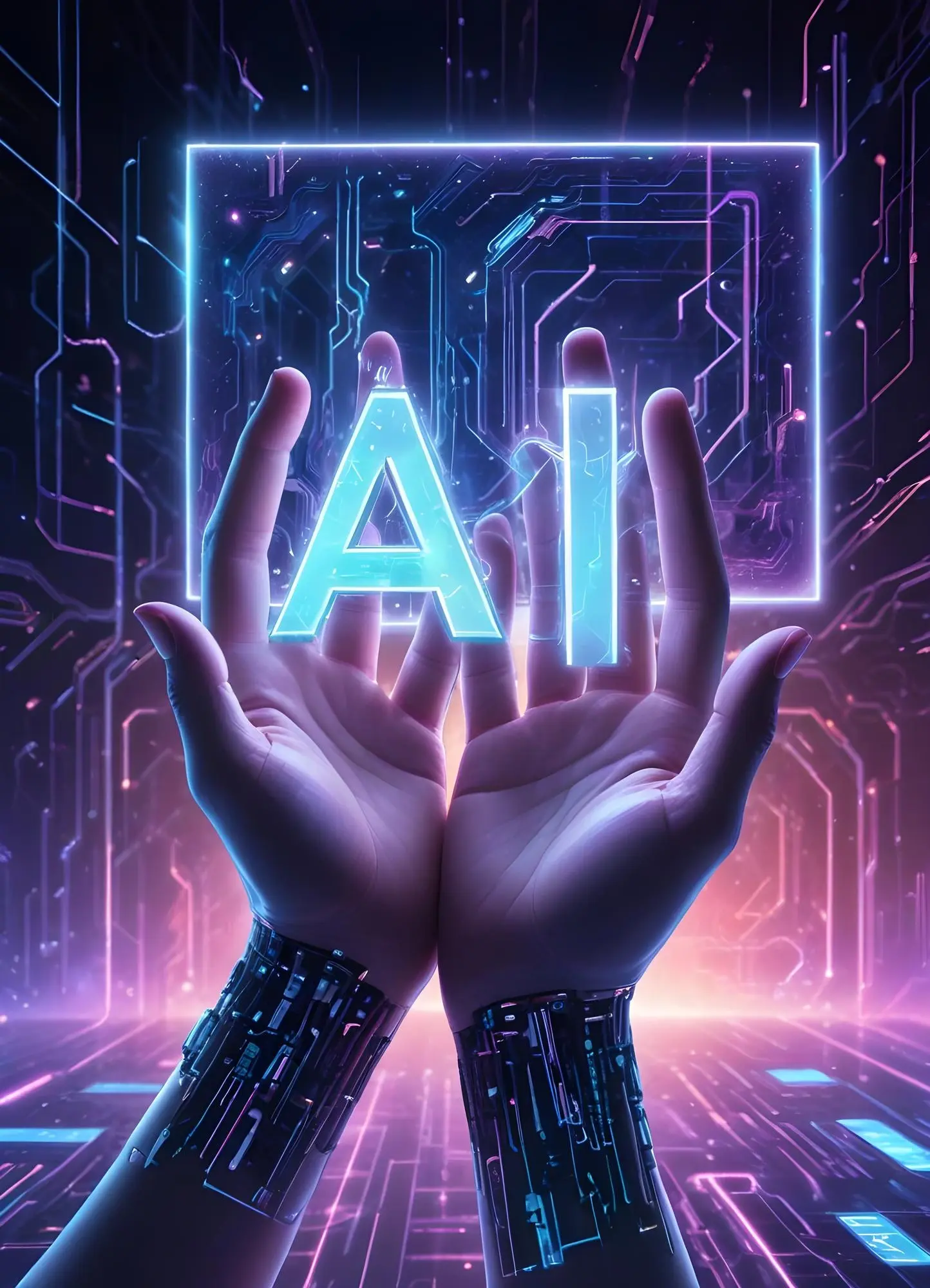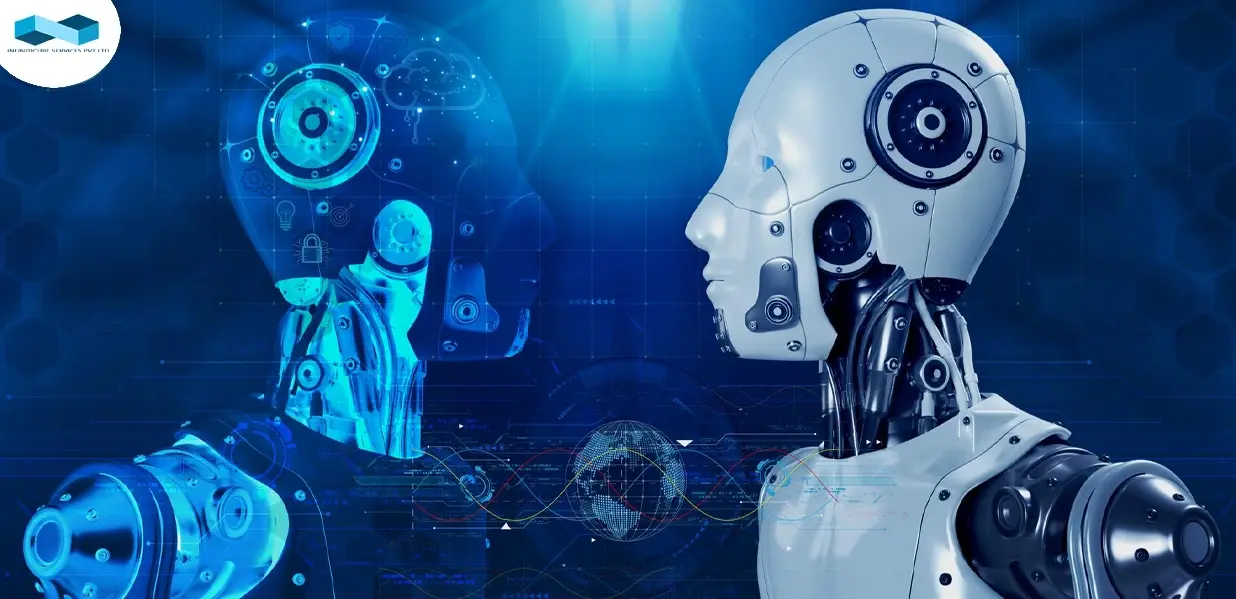AI Agents: A Complete Guide to Key Elements and Applications
I. Introduction to AI Agents
AI agents are autonomous entities that perform tasks using advanced algorithms and machine learning. They simulate human-like intelligence, enabling independent operation with minimal human input. There are several types of AI agents, including reactive agents, which respond to environmental stimuli without memory; limited memory agents that retain recent information; theory of mind agents that understand emotions and intentions; and self-aware agents capable of self-reflection.
The evolution of AI has progressed from simple rule-based systems to sophisticated agents capable of learning and adapting. AI agents are crucial for automation, decision-making, transforming industries, improving efficiency, and enhancing daily life. Unlike traditional automation tools, AI agents learn, adapt, and solve complex problems autonomously, making them essential in modern applications. Their continued development is set to drive future innovations.

Boost Accuracy and Efficiency
II. Key Elements of AI Agents
Autonomy
Definition of Autonomy in AI Agents
Autonomy in AI agents refers to their ability to operate and make decisions without constant human intervention. An autonomous AI agent can independently evaluate its environment, analyze data, and take action based on its programming, goals, and learned experiences. This autonomy allows AI agents to perform complex tasks with minimal or no human guidance.
How AI Agents Operate Without Human Intervention
AI agents achieve autonomy by combining their ability to sense their environment, process information, and make decisions using pre-programmed rules or learned patterns. They continuously monitor their surroundings through sensors or data inputs, assess the current state, and take the most appropriate action to achieve their objectives. Autonomous AI agents can also handle unexpected events or changes in their environment, which allows them to adapt dynamically to new situations.
Examples of Autonomy in AI Applications
- Self-Driving Cars: Autonomous vehicles can navigate roads, recognize traffic signs, and avoid obstacles without human drivers, making decisions in real-time based on sensory inputs like cameras and LIDAR.
- Robotic Process Automation (RPA): Autonomous bots in industries can perform tasks such as data entry, processing transactions, and responding to emails without human oversight.
- AI-Powered Drones: Drones used for surveillance, deliveries, or search-and-rescue missions can operate autonomously by navigating their environments and adjusting flight paths based on sensor feedback.
Learning Capabilities (Machine Learning and Deep Learning)
Machine Learning Models Used in AI Agents
AI agents rely on machine learning (ML) algorithms to improve their performance by learning from data. These models can be categorized into supervised learning (learning from labeled data), unsupervised learning (discovering patterns in unlabeled data), and reinforcement learning (learning from feedback and rewards). Deep learning, a subset of ML, uses neural networks with multiple layers to model complex patterns in data, enabling AI agents to make more accurate predictions and decisions.
Reinforcement Learning and Supervised Learning in AI Agents
- Supervised Learning: AI agents use supervised learning to learn from labeled data where the correct output is provided. This helps them to recognize patterns and make predictions. For example, an AI agent might be trained to identify objects in images using a dataset of labeled images.
- Reinforcement Learning: In reinforcement learning, AI agents learn through trial and error by interacting with their environment and receiving feedback in the form of rewards or penalties. Over time, they optimize their actions to maximize long-term rewards. This approach is widely used in robotics and gaming AI, where agents must navigate complex environments.
Adaptive Learning in AI Agents: How They Improve Over Time
AI agents are designed to continuously learn from new experiences, adapt their behaviors, and improve performance over time. Through reinforcement learning and other adaptive techniques, agents can fine-tune their strategies and decision-making processes based on the results of previous actions. For example, an AI agent used in a recommendation system (such as Netflix or Amazon) improves its suggestions based on user feedback and interactions.
Decision-Making and Problem-Solving
How AI Agents Analyze Data and Make Decisions
AI agents use data analysis techniques to interpret large volumes of structured and unstructured data. They process this information to identify patterns, predict outcomes, and make decisions that align with their objectives. The decision-making process involves gathering data, applying algorithms to analyze the data, and selecting the most suitable action to achieve a specific goal.
Decision-Making Algorithms and Optimization Techniques
AI agents rely on various decision-making algorithms and optimization techniques to solve problems. Common methods include:
- Rule-Based Systems: These systems follow predefined rules to make decisions, commonly used in simpler AI applications.
- Heuristic Search: AI agents use heuristics to explore possible solutions efficiently, particularly in large search spaces.
- Genetic Algorithms: These optimization techniques mimic natural selection to find optimal solutions through iterations.
- Neural Networks: Deep learning agents use neural networks to make complex decisions, often seen in image recognition or language processing applications.
Real-World Examples of Decision-Making AI Agents
- Financial Trading Systems: AI agents analyze real-time market data and make buy/sell decisions to optimize investment portfolios, often outperforming human traders.
- Healthcare Diagnostics: AI agents assist doctors by analyzing medical data, such as X-rays and MRI scans, to identify diseases and recommend treatments.
- Supply Chain Optimization: AI agents optimize logistics and supply chains by analyzing demand forecasts, inventory levels, and transportation costs, helping businesses streamline operations.
Perception and Sensing
AI agents depend on various sensors and data inputs to perceive their environment. These inputs range from physical sensors (such as cameras, LIDAR, or temperature sensors) to digital data streams (such as online databases, APIs, or social media feeds). By gathering real-time information, AI agents can interpret the world around them and make context-sensitive decisions.
How AI Agents Perceive and Process Their Environment
AI agents process environmental data using advanced algorithms such as computer vision, natural language processing (NLP), and machine learning. These technologies enable them to recognize objects, detect patterns, and interpret human language. Perception in AI agents is crucial for applications like autonomous driving, where vehicles need to detect pedestrians, other cars, and road conditions in real-time.
Role of Computer Vision, Natural Language Processing (NLP), and Speech Recognition
- Computer Vision: AI agents use computer vision to interpret visual information from cameras or images. This technology is widely used in facial recognition, medical imaging, and object detection.
- Natural Language Processing (NLP): NLP enables AI agents to understand and generate human language, making them capable of interacting with users through text or voice. Applications include chatbots, virtual assistants, and language translation tools.
- Speech Recognition: AI agents use speech recognition to convert spoken language into text. This is essential for voice-activated systems like virtual assistants (Siri, Alexa) and automated transcription services.
Interaction and Communication
Human-Agent Interaction Through Chatbots, Voice Assistants, and Virtual Agents
AI agents interact with humans through various interfaces, including chatbots, voice assistants, and virtual agents. These agents are programmed to understand user input, respond to queries, and assist with tasks, such as scheduling meetings, providing customer support, or controlling smart home devices.
- Chatbots: Text-based AI agents that assist users through messaging platforms, websites, or mobile apps.
- Voice Assistants: AI agents that respond to voice commands, such as Amazon's Alexa or Google Assistant.
- Virtual Agents: More advanced agents that simulate human-like conversations in customer service or technical support roles.
Natural Language Understanding (NLU) and Generation (NLG) Capabilities
AI agents utilize natural language understanding (NLU) to interpret and comprehend human language. NLU allows AI agents to extract meaning from user input, recognizing the intent behind questions or commands. On the other hand, natural language generation (NLG) enables AI agents to produce human-like responses, making their communication more interactive and user-friendly.
Examples of AI Agents Communicating in Real-World Settings
- Customer Support Chatbots: Many companies use AI chatbots to provide 24/7 customer support, answering common queries or troubleshooting issues.
- Virtual Tutors: AI agents in education platforms help students by answering questions, explaining concepts, or providing learning recommendations.
- Voice Assistants: Devices like Amazon Echo and Google Home are equipped with AI agents that respond to user commands, control smart home devices, and provide real-time information (such as weather updates or calendar reminders).
III. Popular Applications of AI Agents
Customer Service and Support
AI-Powered Chatbots and Virtual Assistants (e.g., Siri, Alexa)
AI agents, in the form of chatbots and virtual assistants like Siri, Alexa, and Google Assistant, are transforming how customers interact with businesses. These AI-powered tools can handle a wide range of tasks, from answering FAQs to managing calendars and even controlling smart devices, offering a seamless user experience.
AI Agents Handling Queries and Offering Personalized Customer Support
AI agents excel at providing 24/7 customer support, handling queries in real time, and offering personalized responses based on user data. With machine learning, they can recognize user preferences and provide tailored solutions. For example, a retail chatbot might recommend products based on past purchases or browsing history.
Examples from Industries (e.g., Retail, Banking, Hospitality)
- Retail: AI agents are used to answer product-related questions, process returns, and offer shopping assistance.
- Banking: Virtual assistants help customers manage accounts, process payments, and track expenses.
- Hospitality: AI agents assist guests with booking reservations, check-in/check-out, and answering hotel-related queries, enhancing the guest experience.
Healthcare
AI Agents Assisting in Medical Diagnostics and Treatment Plans
AI agents in healthcare analyze medical data such as radiology scans or patient histories to assist doctors in diagnosing illnesses and creating personalized treatment plans. AI systems like IBM’s Watson Health can sift through vast amounts of data to suggest optimal treatments based on evidence.
Use Cases in Telemedicine, Remote Patient Monitoring, and Personalized Healthcare
- Telemedicine: AI agents enable remote diagnosis and consultations, providing patients access to medical expertise from home.
- Remote Patient Monitoring: AI agents monitor patients’ vital signs and health metrics, alerting medical staff if anomalies are detected.
- Personalized Healthcare: AI-powered systems recommend treatments tailored to individual patients based on their genetics, lifestyle, and medical history.
Benefits and Ethical Considerations in Healthcare AI Agents
AI agents increase diagnostic accuracy, reduce healthcare costs, and enable faster data-driven decision-making. However, there are ethical concerns regarding data privacy, bias in AI algorithms, and the potential for over-reliance on AI at the expense of human judgment in critical situations.
Finance and Banking
AI Agents in Fraud Detection and Risk Management
AI agents in the financial sector are crucial for identifying fraudulent activities by analyzing transaction patterns and detecting anomalies. Machine learning algorithms continuously learn from new fraud tactics, helping banks stay ahead of malicious actors.
Automation of Financial Transactions and Investment Advice
AI agents automate mundane tasks like transaction processing, loan approvals, and credit scoring, making banking more efficient. They also provide personalized investment advice by analyzing market trends and user portfolios, helping customers make informed financial decisions.
Examples of AI Agents in Financial Trading and Customer Support
- Financial Trading: AI agents in algorithmic trading platforms execute trades at lightning speed based on real-time market data, optimizing profits.
- Customer Support: Virtual financial assistants help clients manage accounts, transfer funds, resolve disputes, and reduce the workload for human agents.
Manufacturing and Industry 4.0
AI Agents in Process Optimization and Predictive Maintenance
AI agents help manufacturers optimize production processes by analyzing machine performance and workflow data. Powered by AI, predictive maintenance reduces downtime by forecasting when machinery will require repairs, preventing unexpected failures.
Automation of Supply Chains and Logistics Management
AI agents streamline supply chain operations by managing inventory, forecasting demand, and automating procurement. In logistics, AI agents optimize delivery routes, reducing costs and improving efficiency.
Smart Factories and AI-Driven Production Lines
In Industry 4.0, smart factories utilize AI agents to control production lines autonomously, adjusting parameters for quality control, managing resources, and even creating self-regulating systems that minimize human intervention.
E-commerce and Retail
AI agents enhance the customer experience in e-commerce by analyzing user data to recommend products, offering personalized promotions, and guiding customers through their shopping journey. They provide customized product recommendations, improving customer satisfaction and increasing sales.
Automation of Inventory Management and Order Fulfillment
AI agents automate inventory management by predicting demand, placing restock orders, and ensuring optimal stock levels. In order fulfillment, AI agents manage order processing, shipping logistics, and delivery tracking, reducing human error and speeding up the supply chain.
AI agents act as virtual shopping assistants, guiding customers through product selection and answering queries. AI-powered recommendation engines, such as those used by Amazon or Netflix, analyze user preferences to suggest relevant products or media, enhancing customer engagement.
Transportation and Autonomous Vehicles
Role of AI Agents in Self-Driving Cars and Drones
AI agents are at the core of autonomous vehicles, processing sensor data to navigate roads, avoid obstacles, and make real-time driving decisions. Self-driving cars like those developed by Tesla and Waymo rely on AI to operate safely in dynamic environments. Drones use AI for autonomous flight control, often applied in deliveries, surveillance, and agriculture.
Traffic Management and Route Optimization
AI agents in traffic management systems analyze real-time data to optimize traffic flow, reducing congestion and improving safety. In logistics, AI agents calculate the most efficient delivery routes, saving time and fuel costs.
AI Agents Improving Safety and Efficiency in Logistics
AI agents in logistics operations monitor the condition of vehicles, predict maintenance needs, and coordinate fleet movements. This results in enhanced safety, reduced operational costs, and increased efficiency across transportation networks.
Smart Homes and IoT
AI Agents in Home Automation Systems (e.g., Thermostats, Security)
AI agents power home automation systems, controlling devices like thermostats, lighting, and security systems based on user preferences and sensor data. For example, smart thermostats like Nest adjust heating and cooling based on occupancy patterns and weather forecasts, enhancing comfort while reducing energy consumption.
Integration with IoT Devices for Smart Living
AI agents integrate with IoT devices to create connected smart homes where multiple systems (lighting, appliances, security, entertainment) work in harmony. Voice assistants like Alexa serve as the central hub for managing these devices, making everyday tasks more convenient.
Use Cases for Energy Efficiency and Security

Discover How AI Can Streamline Your Business
IV. AI Agents in Emerging Technologies
Role of AI Agents in Virtual Worlds and Immersive Experiences
In the evolving concept of the metaverse—shared, persistent virtual environments—AI agents play a vital role in enhancing user experiences. They assist in building dynamic, interactive virtual worlds by managing non-playable characters (NPCs), simulating social interactions, and driving complex behaviors within these environments.
Use in Social Interactions, Virtual Assistants, and Personalized Avatars
AI agents act as virtual assistants and companions in the metaverse, helping users navigate these immersive environments, answer questions, or engage in conversations. Personalized avatars, driven by AI, can be tailored to represent users with unique behaviors, preferences, and even learning abilities, making virtual interactions feel more lifelike and responsive.
AI Agents in Robotics
How AI Agents Power Autonomous Robots
AI agents serve as the decision-making core of autonomous robots. By combining machine learning, computer vision, and sensor integration, these agents enable robots to navigate environments, perform tasks, and interact with objects independently. This technology drives advancements in both industrial and consumer robotics.
Applications in Industrial Robots, Home Robots, and Robotic Process Automation (RPA)
- Industrial Robots: AI agents guide robots in manufacturing settings, automating tasks like welding, assembly, and quality control, improving precision and efficiency.
- Home Robots: Consumer robots, such as robotic vacuum cleaners, use AI to map rooms, avoid obstacles, and learn user preferences for cleaning schedules.
- Robotic Process Automation (RPA): AI agents enhance RPA by automating repetitive tasks in business operations, such as data entry, invoice processing, and workflow management.
AI Agents in Cybersecurity
Use of AI Agents in Threat Detection and Response
AI agents are transforming cybersecurity by proactively identifying potential threats and responding to attacks. Using machine learning algorithms, these agents analyze large datasets to detect patterns and anomalies that might signal a cyberattack, enabling faster and more effective response measures.
AI Agents Protecting Against Cyberattacks and Vulnerabilities
AI agents strengthen defense systems by continuously monitoring networks, detecting vulnerabilities, and deploying countermeasures. They help secure sensitive data by predicting potential attack vectors and mitigating risks before breaches occur.
Real-Time Monitoring and Anomaly Detection with AI Agents
AI agents offer real-time monitoring of systems and networks, identifying anomalies such as unusual login patterns or irregular data flows. These agents can initiate alerts or autonomously block suspicious activities, preventing security breaches in critical infrastructure.
AI Agents in Education
AI agents in education serve as virtual tutors, providing personalized instruction to students. These agents can adapt to a student's learning pace and style, offering tailored feedback and resources that enhance the learning experience.
Role of AI Agents in Grading, Assessments, and Curriculum Suggestions
AI agents are also used to automate grading and assessment processes, ensuring consistency and freeing up time for educators. They can analyze students' performance data to recommend adjustments to curriculum plans, offering personalized suggestions to improve learning outcomes based on individual needs and progress.

Embrace AI for Real-Time Insights
V. Challenges and Limitations of AI Agents
Ethical Concerns
Bias in AI Agent Decision-Making
AI agents often inherit biases present in the data they are trained on. This can lead to unfair decision-making, particularly in sensitive areas like hiring, lending, and law enforcement. The challenge lies in identifying and mitigating these biases to ensure fair and equitable outcomes for all users.
Privacy Concerns and Data Security Risks
AI agents rely heavily on vast amounts of personal data to operate effectively. This raises significant concerns about user privacy, as these agents collect, process, and sometimes share sensitive information. Ensuring robust data protection and transparency in how data is used are key concerns in the development of AI agents.
Ethical Dilemmas in Autonomous Decision-Making
AI agents making autonomous decisions, especially in critical areas such as healthcare or self-driving cars, face ethical dilemmas. For example, in life-threatening situations, AI agents may need to make choices about which course of action is the least harmful. Developing ethical frameworks that guide these decisions remains a major challenge for AI developers.
Technical Challenges
Issues with Training Data and Model Accuracy
The quality of an AI agent's performance depends heavily on the training data it receives. Incomplete or biased data can result in inaccurate models, limiting the effectiveness of AI agents. Additionally, training AI models that generalize well across various situations remains a technical hurdle.
As AI agents are tasked with solving more complex problems, scaling their capabilities while maintaining performance is a challenge. AI systems often face bottlenecks when processing vast datasets or making real-time decisions in complex, dynamic environments. Ensuring scalability without sacrificing speed or accuracy is a critical limitation.
Human-AI Interaction Challenges
Trust and Transparency Issues with AI Agents
A key issue in the deployment of AI agents is building user trust. Many AI systems are seen as "black boxes," making it difficult for users to understand how decisions are made. Without transparency, users may be hesitant to rely on AI agents, especially in high-stakes situations. Explaining AI decisions in a comprehensible manner is crucial to building trust.
Challenges in Human-AI Collaboration
Effective collaboration between humans and AI agents requires smooth interaction and communication. In many cases, human users may not know how to best leverage AI agents, or they may face difficulties in interpreting AI suggestions. Bridging the gap between human intuition and AI-driven decision-making requires improved user interfaces and interaction models.
Addressing the Fear of Job Displacement
One of the major social challenges posed by AI agents is the fear of job displacement. As AI agents automate more tasks, particularly in industries like manufacturing, customer service, and finance, there is growing concern over job loss. Ensuring a balance between automation and human employment, along with reskilling workers for new roles, is essential to address this challenge.
VI. Future Trends and Innovations in AI Agents
Advancements in AI Agent Learning
Next-Gen Reinforcement Learning and Unsupervised Learning
AI agent learning techniques are rapidly evolving, with next-generation reinforcement learning and unsupervised learning at the forefront. These approaches enable AI agents to learn from their environments and experiences without relying on vast amounts of labeled data. The future will see more sophisticated reinforcement learning algorithms that allow AI agents to make smarter, faster, and more optimized decisions, even in complex or unfamiliar environments.
Self-Learning AI Agents That Require Less Human Intervention
One of the most significant advancements on the horizon is the development of self-learning AI agents, which can learn and adapt with minimal human supervision. These agents will be able to autonomously acquire new knowledge, refine their skills over time, and improve their performance, ultimately reducing the need for frequent updates or retraining by human developers. This evolution could lead to AI agents that continually improve and adjust to changing circumstances in real-time.
AI Agents in Augmented Reality (AR) and Virtual Reality (VR)
AI agents are increasingly being integrated into AR and VR platforms to create fully immersive, interactive experiences. In augmented reality, AI agents can overlay digital information onto the real world, providing real-time assistance, information, or navigation. In virtual reality, these agents can interact with users within entirely digital environments, creating a seamless fusion of AI and immersive technology for entertainment, education, and professional training.
Virtual AI Agents Guiding Users in Digital Environments
Virtual AI agents in AR/VR applications are evolving to serve as guides or companions in digital environments. Whether assisting users in navigating complex simulations, offering advice in virtual shopping experiences, or acting as NPCs in virtual worlds, these AI agents will increasingly enhance the realism and utility of AR and VR technologies.
AI Agents in Personalized Services
Hyper-Personalization Through Advanced Data Analytics
The future of AI agents lies in their ability to offer hyper-personalized services. By leveraging advanced data analytics, AI agents will be able to predict user preferences, behaviors, and needs more accurately. These agents will go beyond simple suggestions to offer tailor-made experiences that fit individual users' unique patterns, tastes, and habits, providing highly customized interactions in areas such as e-commerce, entertainment, and customer service.
AI Agents Understanding User Emotions and Behaviors
Incorporating emotional intelligence into AI agents is a key innovation. With advancements in affective computing, AI agents will be able to recognize and respond to human emotions through sentiment analysis, facial recognition, and speech patterns. This emotional understanding will allow AI agents to offer more empathetic, human-like responses, improving user engagement and satisfaction across industries, from healthcare to customer service.
Collaborative AI Agents
AI Agents Working in Teams with Humans and Other AI Systems
The next wave of AI agent development focuses on collaboration. AI agents will increasingly work in tandem with humans and other AI systems to solve complex, multifaceted problems. This collaboration will involve distributing tasks among human teams and AI agents, where each complements the other's strengths—AI handling data-heavy or repetitive tasks, while humans focus on creative and strategic decision-making.
Enhanced Human-AI Collaboration for Complex Problem-Solving
Collaborative AI agents will excel in scenarios where human expertise and AI capabilities must merge, such as in healthcare, legal analysis, or research. AI agents will assist in breaking down large problems, proposing solutions, and adapting their suggestions based on feedback from human collaborators. These agents will empower humans to tackle problems that are currently beyond the capacity of either human experts or AI alone, leading to breakthroughs in various sectors.
VII. Conclusion
AI agents are autonomous technologies that learn, make decisions, and communicate effectively. They enhance efficiency across various sectors, including healthcare and finance, by automating tasks and improving user experiences. Their role in industries like e-commerce and transportation is growing, enabling personalized services and better decision-making. As AI agents evolve, advancements in technology will make them more capable of handling complex tasks and integrating them into daily life. However, challenges related to ethics and privacy persist. Overall, AI agents are set to reshape industries and society, driving technological progress and innovation in the future.
Empowering Your Business with Cutting-Edge AI Agents Solutions
At Infiniticube, we specialize in delivering state-of-the-art AI agent solutions that enhance efficiency, decision-making, and personalized services across industries. Whether you're looking to integrate autonomous AI systems into customer service, healthcare, manufacturing, or finance, our AI agents are built to adapt, learn, and operate independently—transforming the way you do business.
With expertise in the latest AI advancements, including machine learning, natural language processing, and autonomous decision-making, we craft AI agents that fit seamlessly into your operations. From optimizing supply chains and automating customer interactions to enhancing smart homes and securing digital environments, we tailor solutions that meet your specific needs.
Take Your Business to the Next Level with Intelligent AI Agents
Don't miss out on the future of automation and innovation. Contact us today to discover how AI agents can revolutionize your business!
 June 27, 2025
June 27, 2025
 Balbir Kumar Singh
Balbir Kumar Singh
 0
0
 June 13, 2025
June 13, 2025
 Balbir Kumar Singh
Balbir Kumar Singh
 0
0













Leave a Reply